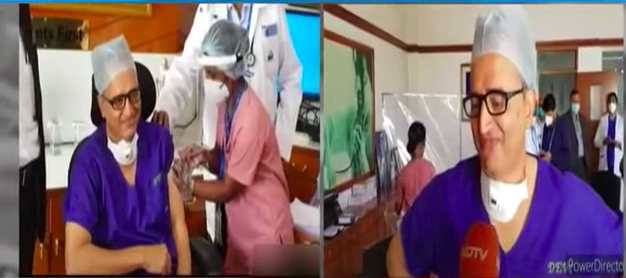Highlights
- India launched the vaccination programme on January 16
- Till Monday (January 18) evening, India inoculated, 3.8 lakh people
- I feel great after receiving the vaccine, said Dr Devi Shetty
New Delhi: On day 3 of India’s vaccination drive against the COVID-19, Dr Devi Shetty, a top cardiac surgeon in the country and founder and Chairman of Narayana Healthcare, received his vaccine shot in Bengaluru. He spoke to NDTV on the apprehensions that surround the vaccine, way ahead for India in its fight against coronavirus and more. Sharing his experience of getting vaccinated, he said,
I feel great and I am very proud of my nation.
Talking about how India has fared in its COVID-19 fight, Dr Shetty further added,
We should be very proud, today. The way things have turned out, the way our government has encouraged all industries to come together and develop the vaccine to fight coronavirus and the way now it is getting distributed, it has all been done in a record period of time.
Also Read: Health And Frontline Workers Take The First Jab Of COVID-19 Vaccine, Feel ‘Safe And Proud’
Dr Shetty also said that every individual should know that India is one of the leaders in the fight against coronavirus, he said,
There are only five countries in the world that have the capability to make and distribute vaccines and India is one of them.
Further talking about the task and the road ahead for India in its ongoing fight against the virus, Dr Shetty said,
Now the task left for all of us is to vaccinate the maximum number of people or half our country’s population in a record period of time.
When asked when will India finish inoculating the maximum number of people, Dr Shetty said that he is confident that India can do it in two months of time with just 34,700 nurses. He added,
I think, and obviously my suggestion is theoretical, if all 34,700 nurses have infrastructure facilities available and there is someone to feed in the data for them in the system, we will be able to cover 500 million people in two months’ time.
Also Read: Vaccine Will Work As ‘Sanjeevani’ Against COVID-19, Says Union Health Minister
A Look At India’s Coronavirus Fight
In a total, 3.8 lakh people have been vaccinated in India since the rollout of the coronavirus vaccines on January 16, according to the government data released on Monday (January 18) evening.
Among the number of people inoculated, so far, 580 cases of adverse reactions have been observed of which seven persons have been hospitalised in the country. According to the government, all the adverse events after immunisation falls in the category of minor and non-serious.
Also Read: Coronavirus Explainer: What Are Adverse Events Post COVID-19 Immunisation
In terms of coronavirus cases, India reported 10,064 fresh cases in the last 24 hours, which is the lowest surge in daily COVID cases in nearly seven months. The country has logged 1.05 crore cases since the beginning of the pandemic and over 1.02 crore people have already recovered, as per the government data.
NDTV – Dettol Banega Swasth India campaign is an extension of the five-year-old Banega Swachh India initiative helmed by Campaign Ambassador Amitabh Bachchan. It aims to spread awareness about critical health issues facing the country. In wake of the current COVID-19 pandemic, the need for WASH (Water, Sanitation and Hygiene) is reaffirmed as handwashing is one of the ways to prevent Coronavirus infection and other diseases. The campaign highlights the importance of nutrition and healthcare for women and children to prevent maternal and child mortality, fight malnutrition, stunting, wasting, anaemia and disease prevention through vaccines. Importance of programmes like Public Distribution System (PDS), Mid-day Meal Scheme, POSHAN Abhiyan and the role of Aganwadis and ASHA workers are also covered. Only a Swachh or clean India where toilets are used and open defecation free (ODF) status achieved as part of the Swachh Bharat Abhiyan launched by Prime Minister Narendra Modi in 2014, can eradicate diseases like diahorrea and become a Swasth or healthy India. The campaign will continue to cover issues like air pollution, waste management, plastic ban, manual scavenging and sanitation workers and menstrual hygiene.
[corona_data_new]






























